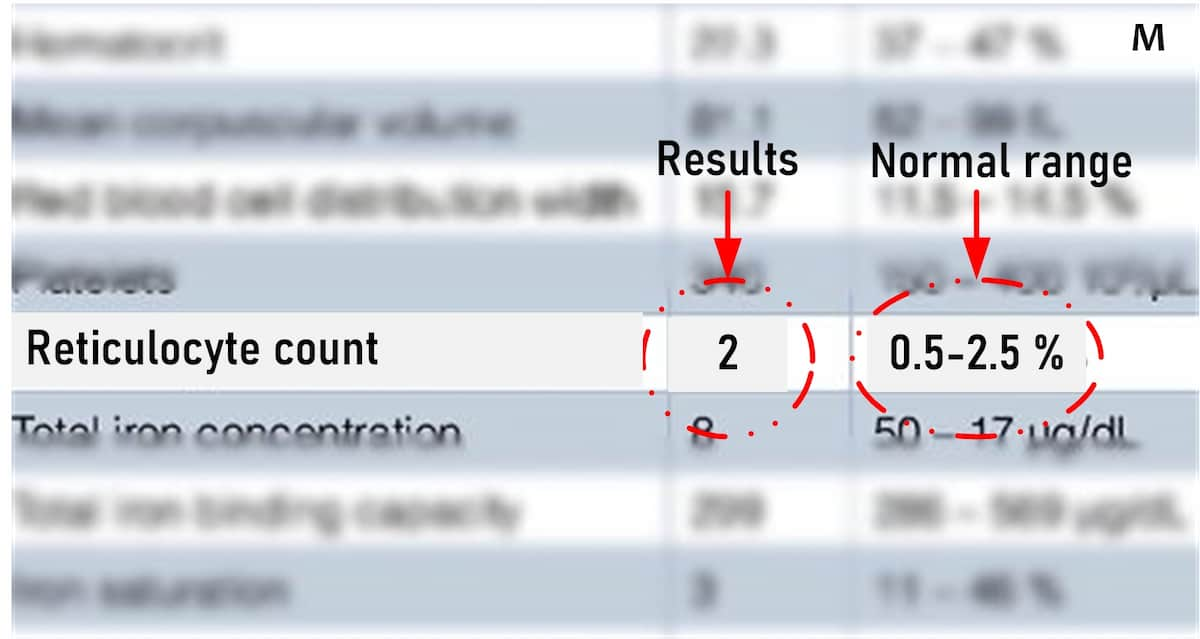Content :
◉ What is Reticulocyte count?
The reticulocyte count test is a laboratory test that measures the percentage of reticulocytes in the blood. It is used to evaluate how well the bone marrow is responding to anemia or other conditions that may lead to a decrease in the number of red blood cells.
Reticulocytes are immature red blood cells that are made in the bone marrow and released into the bloodstream. They develop into mature red blood cells after about two days.
- A high reticulocyte count may indicate that your bone marrow is producing more red blood cells to compensate for blood loss or other causes of anemia.
- A low reticulocyte count may indicate that your bone marrow is not making enough red blood cells due to iron deficiency, vitamin B12 deficiency or other causes of hypoproliferative anemia.

◉ Why it's done?
Reticulocytes are an important indicator of the amount of red blood cells produced by the bone marrow and entering the peripheral blood. Therefore, they serve as an index of effective erythropoiesis.
The test is performed to determine whether red blood cells are produced in the bone marrow at an appropriate rate in response to various conditions. The reticulocyte rate also allows:
- Classification and diagnosis of anemia.
- Monitoring response to treatment.
- Diagnose and monitor bone marrow disorders.
- Monitor chronic diseases that affect red blood cell production.
◉ Preparation and blood sampling
To prepare for the test, you may need to fast for a certain period of time or avoid taking some medications before the blood draw. Your doctor will give you specific instructions based on your situation.
The test is done by taking a small sample of blood from a vein in your arm or hand. The blood sample is sent to a laboratory for analysis.
At the laboratory, technicians place the sample into a special instrument that measures all of the cells in your blood sample, including the number of reticulocytes and other important cell characteristics.
◉ Normal value of reticulocyte count
The normal range for a reticulocyte count test varies depending on the age and health status of the person. Generally:
- the normal range for adults is (0.5% to 2.5%) of the total red blood cells.
- the normal range for infants is (2% to 6%).
Note: These values may differ slightly depending on the laboratory and the method used.
◉ High reticulocyte count
A high level of reticulocyte count test means that your bone marrow is producing more red blood cells than normal.
◉ 1. Causes of High Reticulocyte Count
- Hemolytic anemia: This is a condition where your red blood cells are destroyed faster than they can be replaced.
- Bleeding: If you lose a lot of blood due to an injury, surgery, or menstruation, your bone marrow may increase the production of reticulocytes to replace the lost blood cells.
- Blood disorder in a fetus or newborn (erythroblastosis fetalis): This is a rare condition that occurs when the mother's blood type is not compatible with the baby's blood type. The mother's immune system may attack the baby's red blood cells, causing hemolytic anemia in the baby.
- Kidney cysts or tumors: Some kidney diseases or cancers may produce a hormone called erythropoietin, which stimulates the bone marrow to make more red blood cells.
- Bone Marrow Recovery: Following bone marrow suppression, such as after chemotherapy or radiation therapy, the reticulocyte count may rise as the bone marrow regains its normal function and begins producing new red blood cells.
◉ 2. Symptoms of High Reticulocyte Count
- Fatigue and weakness
- Pallor (pale skin)
- Shortness of breath
- Rapid heart rate
- Jaundice (yellowing of the skin and eyes) in cases of hemolytic anemia
- High blood pressure, headache, nausea, and itching.
◉ Low Reticulocyte Count
Decreased reticulocyte count (medically known as reticulocytopenia) which means that your bone marrow is not making enough new red blood cells.
◉ 1. Causes of Low Reticulocyte Count
- Anemia caused by low iron levels, or low levels of vitamin B12 or folate.
- Bone marrow failure (for example, from a certain drug, tumor, radiation therapy, or infection).
- Aplastic anemia, a rare condition where the bone marrow stops making new blood cells.
- Chronic kidney disease, due to decreased amounts of a key hormone called erythropoietin.
◉ 2. Symptoms of Low Reticulocyte Count
- Fatigue and weakness
- Pale skin and mucous membranes
- Shortness of breath and chest pain
- Rapid or irregular heartbeat
◉ Related analytical tests
The reticulocyte count test is often used in conjunction with other related analytical tests to provide a comprehensive assessment of red blood cell production and function.
Here are some commonly performed tests that are related to the reticulocyte count.
- Complete Blood Count (CBC): A CBC provides information about the different components of blood.
- Blood Smear Examination: A blood smear is a microscopic examination of a thin layer of blood on a glass slide. It allows visual assessment of the morphology and characteristics of red blood cells.
- Iron Studies: Iron studies evaluate the body's iron status, including serum iron levels, total iron-binding capacity (TIBC), and ferritin levels.
- Bone Marrow Aspiration and Biopsy: In certain cases, a bone marrow aspiration and biopsy may be performed to evaluate the bone marrow directly.
◉ Conclusion
The reticulocyte count test plays a vital role in the diagnosis and management of various hematological disorders. Its ability to assess red blood cell production and maturation provides valuable insights into a patient's overall hematological health.
By combining the results of this test with other clinical information, healthcare professionals can make informed decisions regarding treatment and patient care.